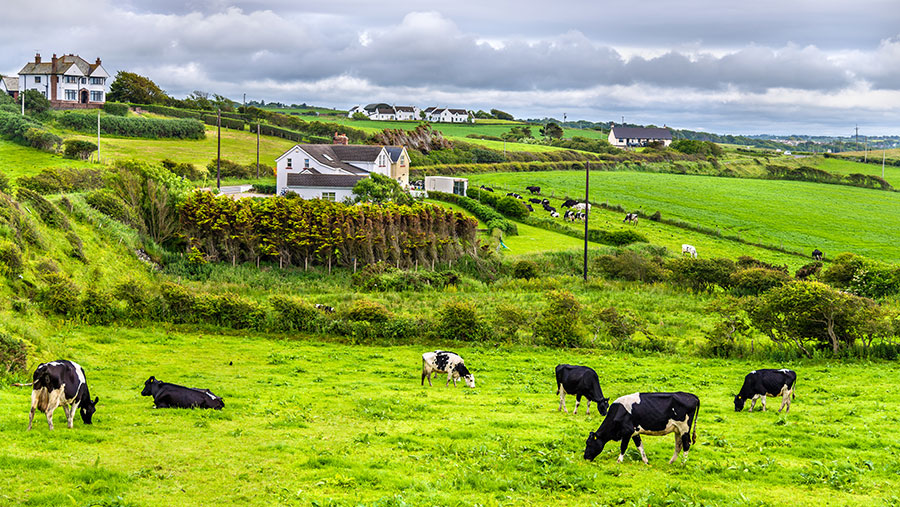NI farmers ‘at end of tether’ over bovine TB inaction
 © Leonid Andronov/Adobe Stock
© Leonid Andronov/Adobe Stock The Ulster Farmers’ Union (UFU) is urging agriculture minister Edwin Poots to deliver a meaningful bovine TB strategy for Northern Ireland, including wildlife intervention.
The NI Department for Agriculture, Environment and Rural Affairs (Daera) is expected to publish its revised strategy on bovine TB later this month.
Daera’s consultation, which closed for comment in September 2021, attracted 3,367 responses, with the vast majority from the farming community (PDF).
See also: NI dairy farmers lose entire herd to bovine TB
The NI executive accepts that some form of wildlife intervention is needed to break the cycle of TB infection.
The consultation outlines its preferred method is a non-selective badger cull in areas where there are high rates of TB on farms, delivered and paid for by farmers, as a precursor to entering a vaccination phase in later years.
Overall, the consultation found that 85% of respondents were in favour of wildlife intervention.
Cross-party support
UFU president Victor Chestnutt said livestock farmers in the province were frustrated and “at the end of the tether” with government inaction on bovine TB.
He told Farmers Weekly: “We really need this over the line. We have a farming minister [Edwin Poots] that wants to do it [wildlife intervention].
“As far as we are aware, we have cross-party support from both orange and green, which is very important in Northern Ireland. Both sides realise that it is unfortunate that we have to control the wildlife, or we’re never going to get rid of this scourge.”
Mr Chestnutt said UFU leaders had witnessed the success of wildlife intervention in England first-hand.
Wildlife intervention was “probably not a vote winner for most politicians”, he acknowledged, but said many on both sides now realised “it is a necessary step that has to be taken”.
At the UFU’s recent executive meeting on Monday (28 February), members agreed to use all means necesssary, including a judicial review on the matter, to get the policy over the line.
Mr Chestnutt said NI livestock farmers were still farming under EU rules, adding that a lot of changes in TB regulations on the Continent would affect how they farm.
For example, a large proportion of NI cattle farms were under three-monthly testing arrangements which was causing extra work and further frustration.
“We’re quite keen to play our part, but we can’t face any more on-farm restrictions until we tackle the whole problem,” he said. “But we’re not getting anywhere. It’s just testing for the sake of testing. We’re not tackling the other side of the problem.”
Last year, official figures showed 14,355 cattle in Northern Ireland were compulsorily slaughtered due to bovine TB – an increase of 11.7% on the previous year.
Compensation shake-up
At present, farmers receive 100% of the market value for TB-condemned cattle. The new TB strategy proposes to cut this to 75% and cap compensation at £5,000 per animal.
The results of Daera’s consultation showed 95% were opposed to changes being made to the livestock valuation payments which farmers receive. The UFU says it “will not tolerate any amendment to payments within the TB programme”.
Animal welfare groups including the Ulster Society for the Prevention of Cruelty to Animals, Ulster Wildlife, and Northern Ireland Badger Group have launched a petition against Daera plans to start culling badgers. They argue that badger culling has not been successful in other countries.
Daera response
A Daera spokesperson said: “The eradication of bovine tuberculosis (bTB) from the Northern Ireland cattle herd remains one of minister Poots’ top priorities. Officials have been working at pace to finalise the new Bovine TB Eradication Strategy for Northern Ireland.
“Within the proposed new strategy there is an opportunity to implement a new approach, a holistic deployment of all the tools at our disposal, with government and the farming industry working together to tackle this most challenging of diseases.
“The minister will consider along with the responses to the consultation, advice provided by veterinary and policy officials, field evidence from other jurisdictions, environmental assessments and the comprehensive business case, in making final decisions.
“In recent years, the Northern Ireland TB Programme has cost up to £40m each year, with compensation payments amounting to well over half of this amount.”
